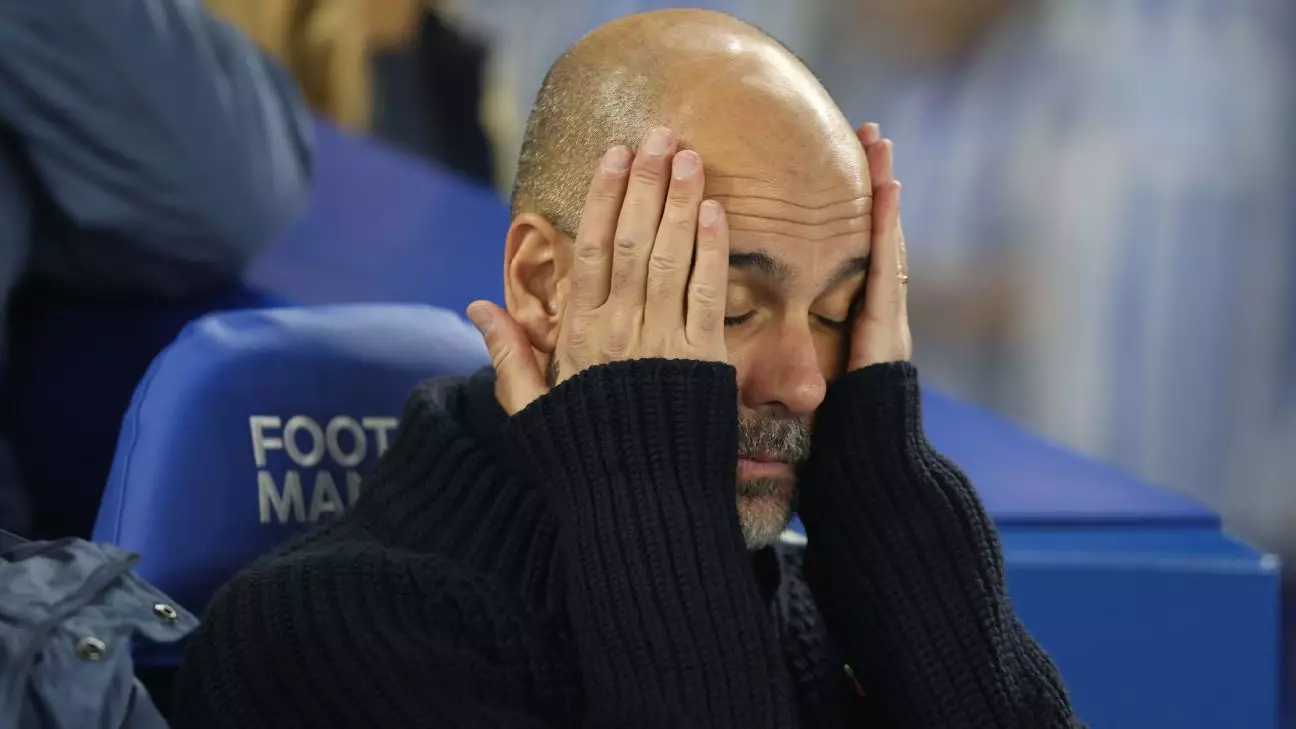The saga unfolding at Manchester City has taken an unexpected twist, leaving both fans and pundits questioning the once unshakeable foundations established under Pep Guardiola’s distinguished stewardship. The manager, celebrated for orchestrating triumph across multiple leagues, now finds himself grappling with an unfamiliar reality: the looming specter of a crisis.
Notably, Guardiola experienced his first four-game losing streak in senior management following a recent Premier League defeat to Brighton. This revelation marks a stark deviation from the norm for a manager whose career has been defined by relentless success since his days at Barcelona. Such misfortune, especially within the tight timeframe of ten days, is not only alarming but remarkable in its implications. In contrast to the triumphant narrative that sees City crowned champions, these setbacks raise questions about the resilience of a squad that only recently dominated English football.
As City succumbed to losses against Tottenham, Bournemouth, Sporting CP, and Brighton, doubts began to circulate about the club’s ability to maintain its elite status. Every accolade won feels like a distant echo, replaced by a newfound anxiety that threatens to unravel everything Guardiola has built. The juxtaposition of previous glories against current misfortunes serves as a haunting reminder: dynasties do not last forever.
Guardiola’s response to inquiries about whether his era at City has reached its twilight highlights an acute awareness of the pressures mounted by both performances and expectations. He stated, “I know people want that,” revealing an understanding of the public’s appetite for narrative drama in sports. Yet, the realities underpinning his tenure unfold against a backdrop of financial scrutiny and shifting team dynamics.
Outside the lines, Manchester City faces a barrage of serious allegations concerning financial misconduct. While the club vehemently denies these claims, the turbulence stemming from 115 reported charges has had detrimental effects on their recruitment strategy. Potential signings could easily be deterred from joining an organization seemingly teetering on the edge of severe penalties or even exclusion from the league itself. This uncertainty arguably detracts from Guardiola’s ability to mold his squad in preparing for the rigors of the Premier League.
The news that Txiki Begiristain, the club’s director of football and a key ally for Guardiola, will depart next summer only exacerbates these uncertainties. Begiristain’s imminent exit raises compelling questions about the club’s future direction and whether Guardiola’s own tenure can withstand the transitions on the administrative front.
Delving into tactical implications, injuries to critical players have critically hampered City’s on-field performance. The absence of Rodri, a central figure in City’s operations, since his devastating knee injury has left a visible void. Statistically, his contributions significantly bolster the team’s performance; his presence correlates with a winning rate that contrasts shockingly against the team’s current outcomes. However, even with some early resilience following his injury, the subsequent toll from injuries to other essential players—Kevin De Bruyne, John Stones, and others—is increasingly difficult to overlook.
The treatment of squad depth has landed City in turbulent waters, accentuating the imprudence of failing to proactively replenish their lineup. The departure of Julián Álvarez without the addition of sufficient replacements has spotlighted a crucial error in City’s transfer strategy. With key players aging and approaching the twilight of their careers, much like what happened to Manchester United post-Sir Alex Ferguson, the necessity for a thoughtful transition is indisputable.
Despite these grim realities, writing off Guardiola’s City merely on the basis of recent form would be a mistake. The team remains a mere points deficit behind league leaders Liverpool, retaining the potential to rebound. Guardiola himself expressed optimism, declaring, “When the players come back, I don’t have any doubt that we will be back to our best.” Yet, this assertion may be as much an exercise in self-conviction as it is an affirmation to the outside world.
The narrative is infused with a palpable sense of urgency. Manchester City and Guardiola are now entangled in a complex struggle—a battle that transcends mere results. The intertwining crises—on and off the pitch—could serve either as catalysts for rediscovery or harbingers of decline. The public and media alike will watch with bated breath to see if a team long heralded for its poise and adaptability can indeed navigate through the murky waters of a turbulent season or if they are on the brink of a systematic collapse. In this unfolding drama, only time will reveal whether it is the end of an era or merely a fleeting rough patch in a storied saga of triumph and legacy.

